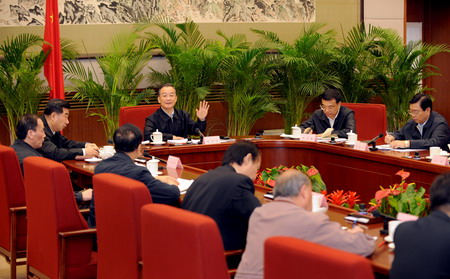Updated: 2008-11-26
(chinadaily.com.cn) Top Chinese government officials are busy these days in an attempt to seek urgent cures to head off a further deteriorating of the world's third largest economy, amid an increasingly chilly economic winter of the world.
 Chinese Premier Wen Jiabao holds talks with top economists and entrepreneurs at the Zhongnanhai leadership compound in downtown Beijing November 25, 2008. [Xinhua] |
Premier Wen Jiabao and his cabinet, whose term expires in March 2013, held “in-depth talks” with top economists and corporate entrepreneurs from a wide range of industries in the past week, to probe the current economic predicament, in the hope that the central government could work out with the newest macro-control measures to “steer the economy out of trouble against a background of global turmoil”, the Xinhua news agency reported Monday.
China's annual economic growth rate slowed sharply to 9 per cent in the third quarter, from 10.4 percent in the first half of the year, because of a sudden plunge in export shipments and a slumping domestic property market.
Latest official statistics showed that the industrial production and exports in October worsened, pointing to a potential crisis of unemployment as employers across the board are cutting their work force. Many export oriented labor-intensive plants in the coastal regions have shut down, thanks to a dry-up of overseas orders.
And, the World Bank has cut its estimate for China's GDP growth rate to 7.5 percent in 2009.
Economists said that if Beijing could not sustain a yearly growth of 8 percent, up to 12 million workers would have lost their jobs next year, posing a very perilous problem for social stability, because more than 90 per cent of farmer-turned-workers do not have protection of nest eggs.
Two weeks ago, Beijing unveiled a massive 4 trillion yuan (US$586 billion) fiscal stimulus package to spur economic growth on rising worries that a further slowdown would destroy a pattern of 30-year rapid economic development, and drive up jobless rate.
According to Xinhua, Premier Wen Jiabao sat down at the Zhongnanhai leadership compound, central Beijing, on November 20 and again November 25, with specialists in a wide range of fields from fiscal policy, finance and the corporate world, to agriculture, real estate and external economy, as well as CEOs from heavyweight sectors including petrochemical, telecommunications, auto, steel, nonferrous metal, machinery manufacturing, logistics and real estate.
The economists and corporate heads at the meetings gave their views on the current global economic and financial situation, China's fiscal and monetary policies, and special concerns relating rural areas, farmers' income, real estate, finance, and industrial restructuring.
Wen said that the complication of the ongoing global economy had brought along new difficulties to adjusting the government's macro policies.
He said it would be difficult to make the right decisions if one was to only "rely on the past experience", or "the wisdom of a few".
Wen said the government would listen to a wide range of opinions in a bid to become "more scientific and democratic" in decision-making, and improve the transparency of decision-making.
Beijing University economist Song Guoqing said at a program on CCTV on Monday that the central government was concerned with the quality of hundreds of new projects, to be funded by the 4-trillion yuan stimulus plan. He advocated that Beijing should invest more on urban affordable housing to jumpstart consumption of steel, cement, building materials and electric appliances.
And, Chinese car owner have convened online meetings, and wrote to the central government asking for immediate reduction of gasoline prices, in keeping with world market. Beijing has kept the price very high, even as the world oil price has lowered by more than 120 percent, drawing lousy complaints from the public.
Economists believe that the government's earlier decision to adopt "active" fiscal and "moderately active" monetary policies in response to changing economic conditions has played an important role in bolstering Chinese economy.
In the past week, Premier Wen and Vice premiers Li Keqiang, Hui Liangyu, Zhang Dejiang and Wang Qishan led inspection tours to enterprises in regions across the country, including the eastern Shanghai Municipality and Zhejiang and Fujian provinces and Hubei Province.








No comments:
Post a Comment